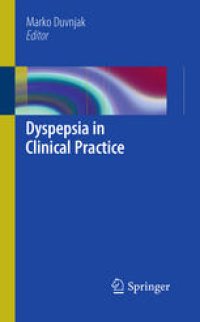
Ebook: Dyspepsia in Clinical Practice
- Tags: Gastroenterology, Primary Care Medicine, Infectious Diseases, Pediatrics
- Year: 2011
- Publisher: Springer-Verlag New York
- Edition: 1
- Language: English
- pdf
Although dyspepsia has been investigated for a long period of time, there is no international agreement on what constitutes this condition nor any standardized guidelines. National guidelines followed by practitioners in different countries vary in diagnostic and therapeutic approach, underlining the necessity for a unique definition worldwide. Dyspepsia in Clinical Practice summarizes the current guidelines while offering a unified, practical definition of dyspepsia, and a diagnostic algorithm with an emphasis on the upper gastrointestinal endoscopy and rational first-line therapeutic approach based on epidemiology, pathophysiology, clinical presentation, diagnostic workup and response to previous therapy. Up-to-date scientific information about dyspepsia is presented from a practical, clinician's point of view, brought by experts in their field. The volume addresses Dyspepsia in childhood and in the elderly, a very important issue often insufficiently emphasized in the literature. Guidelines are provided that can be easily followed in clinical practice, leading to a reduction in costs and patient safety. Dyspepsia in Clinical Practice will be of great value to gastroenterologists, internists, primary care physicians, pediatricians, infectious disease specialists, residents and fellows in training. Dyspepsia in Clinical Practice
Although dyspepsia has been investigated for a long period of time, there is no international agreement on what constitutes this condition nor any standardized guidelines. National guidelines followed by practitioners in different countries vary in diagnostic and therapeutic approach, underlining the necessity for a unique definition worldwide. Dyspepsia in Clinical Practice summarizes the current guidelines while offering a unified, practical definition of dyspepsia, and a diagnostic algorithm with an emphasis on the upper gastrointestinal endoscopy and rational first-line therapeutic approach based on epidemiology, pathophysiology, clinical presentation, diagnostic workup and response to previous therapy. Up-to-date scientific information about dyspepsia is presented from a practical, clinician's point of view, brought by experts in their field. The volume addresses Dyspepsia in childhood and in the elderly, a very important issue often insufficiently emphasized in the literature. Guidelines are provided that can be easily followed in clinical practice, leading to a reduction in costs and patient safety. Dyspepsia in Clinical Practice will be of great value to gastroenterologists, internists, primary care physicians, pediatricians, infectious disease specialists, residents and fellows in training. Dyspepsia in Clinical Practice